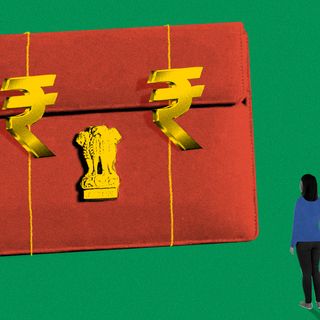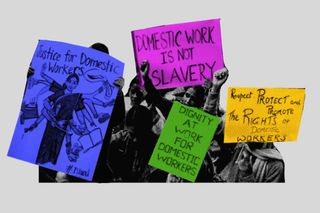
17 Year‑Old Domestic Worker Alleges Severe Abuse by Gurgaon Employers. Why Is Domestic Work Still Such a Vulnerable Profession in India?
The devaluation of household labor means that domestic workers are often paid low wages, leaving them with no bargaining power, and thus, prone to forced labor.

“They hit me with sticks, rope… they hit me with a hot iron tong and used a blade to brand marks on my arm and lips. She would burn paper and light a matchstick and poke me with them… On one occasion, they tried to strangle me and threatened to kill me,” noted a 17-year-old domestic worker, explaining her five-month-long ordeal at the house of her employers in Gurgaon. “I was given only one meal to eat at night, a small bowl of rice, and often ate leftover food from the dustbin since I was hungry for long periods.”
The minor, hailing from Jharkhand, was hired through a placement agency. Her uncle brought her to the house of her employers — Manish Khattar and Kamaljeet Kaur — who have now been arrested. The husband-wife duo worked at a prominent life insurance company and a public relations firm in Gurgaon, respectively. Following her arrest, Kaur was promptly fired by her company.
This isn’t nearly the first instance of a domestic worker in India being subjected to abuse. Last December, a Noida woman was booked after footage showed her forcefully dragging a domestic worker out of a lift. In 2017, after a domestic worker went missing from a housing complex in Noida and other domestic workers were blacklisted from the society for protesting, domestic worker unions boycotted the building.
Meanwhile, the minor is still recovering from her traumatic experience with the couple, and nursing the wounds across her face, arms, hands, back, and feet. “Often, I slept on the floor in the drawing room… without any clothes. She tore the clothes that I had brought along. He disrobed me and hit me with a stick on my private parts.”
The fact that she had to endure months of harassment and abuse, paints a stark picture of how domestic workers in India are uniquely vulnerable to inhuman treatment not only because of the skewed power dynamics in favor of their employers, but also the lack of accountability accorded to the latter due to their wealth and status and society.
Related on The Swaddle:
This creates severely unsafe working conditions for domestic workers. In posh, gated communities, every movement of the workers is monitored, courtesy of apps like MyGate and Servizing. “There are smaller segregated elevators for ‘service staff’ beside the larger ones reserved for residents… If any domestic worker enters the premises without visible bags or luggage, but leaves the society with one, they are required to carry a note signed by a resident attesting to the contents of the bag,” Aishwarya Chandran had written in The Swaddle in 2021, narrating her experience as the resident of an elite, gated community in Gurgaon. “These measures, which by no means are unique to the complex I live in, encourage a culture of suspicion and distrust of the various individuals and communities whose labor makes our houses liveable.”
The employers, meanwhile, aren’t held to nearly the same standard of scrutiny despite multiple cases of well-to-do families with favorable social standing abusing their domestic workers by starving them and forcing them to work tirelessly, in addition to physically and sexually abusing them.
In the present case, too, the abuse of the employers only came to light after an individual spotted the minor with bloodstains on her clothes and injuries across her exposed body parts while she had come out to dispose of garbage. Subsequently, an activist was informed, setting in motion her rescue by a police team while the accused couple was at work.
Further, the devaluation of household labor means that domestic workers are often paid low wages, leaving them with no bargaining power, and thus, prone to forced labor. “Social norms around care work being the responsibility of women and not seeing it as ‘work’ further undervalues domestic workers. This results in below minimum wages and exploitative working conditions,” notes Anushree Jairath, program coordinator of the Gender Justice Team at Oxfam India.
Domestic work remains uniquely unsafe — more so, for workers who live in the homes of their employers, providing them service around the clock. “Women and children who are staying and working (in a house) are very poorly treated, and there is no law really covering them,” Ruth Manorama, a social activist, told The Telegraph. Manorama points out that affluent families often pick minors from far, far away to be employed in their homes. The fact that these workers, then, work in isolation, with no witness to the abuse they endure at the hands of the people in whose homes they find themselves trapped — invisibilizes their abuse, and complicates avenues of recourse.
Related on The Swaddle:
Speaking to the media, the minor said, “I felt helpless and was scared to tell anyone. I had not contacted home for two months as my SIM was not recharged. They kept me confined in the house.” Her anxieties stem from a culture where domestic workers are somehow perceived as lesser humans — disenfranchised by their caste and caste identities, their woes and grievances rarely merit corrective action, and are occasionally, if ever, reduced to mere statistical evidence. As such, it is only natural for one to fear the consequences of speaking out — in the likely event of them not being believed, or not being able to escape successfully, the abuse can worsen.
Even the security guard of the building where she worked, spoke to reporters only on the condition of anonymity — this, when he wasn’t even handing out a negative character certificate to the accused couple, but merely narrating the rescue that he bore witness to.
The plight is shared by thousands of domestic workers from poor and marginalized backgrounds across the globe; their socio-economic status obstructs their path to justice, dooming them to endure prolonged abuse silently.
“[T]here is a dire need for a comprehensive national policy on domestic workers. However, the policy will only be a success if it addresses intersecting issues like the caste and class divide among employers and workers, religion-based discrimination, migration, trafficking, child labor, and gender-based violence,” Jairath noted.
When discrimination against domestic workers in India worsened during the pandemic, the International Labor Organization, too, called for better labor laws for them. Yet, as the present case has revealed, the plight of domestic workers in the country continues to reach new lows.
Devrupa Rakshit is an Associate Editor at The Swaddle. She is a lawyer by education, a poet by accident, a painter by shaukh, and autistic by birth. You can find her on Instagram @devruparakshit.
Related


Why Hindu Nationalists Want to Erase Mughal History
